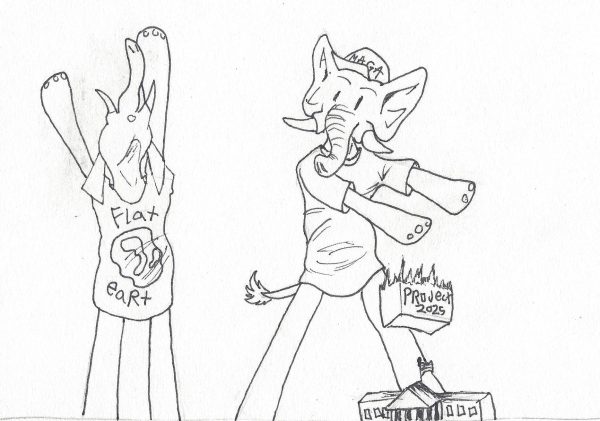Commercial space flight full of gross absurdities
March 11, 2022
The world of commercial space flight is widely glamorized, despite its absurdities: it has a grave impact on the environment, and it’s filled with egomaniacs, gross displays of wealth, and no benefit to the larger population.
Space flight is advertised to the ultra rich—to people like Tom Hanks, who reportedly was offered a trip to space for a cool $28 million (Hanks declined).
“Blue Origin,” the company that made the proposal, is owned by multi-billionaire and Amazon founder Jeff Bezos.
Bezos actually took a trip to space himself back in July of 2021.
He–alongside his brother, and an 18 and 82 year-old (both the youngest and oldest to ever travel to space at the time, respectively)—went on a 10-minute flight 62 miles above Earth before landing in Texas.
The effort was a follow-up to fellow commercial space flight hopeful (and multi-billionaire) Richard Branson.
Branson, with the help of his company “Virgin Galactic,” traveled to space just nine days before Bezos (Bezos narrowly edged Branson at the end, however, by traveling approx. 10 miles higher).
The feud is bigger than bragging rights. What may seem like a friendly and innovative “space-race” between the two has dire consequences.
This is the start of space flight commercialization, meaning traveling to space may become a serious possibility to anyone who can afford it.
This is great for the mega-rich, but for the environment, however? Not so much.
Space exploration has a direct impact on the environment.
The engine used in the flight that Branson took on Virgin Galactic, dubbed a “hybrid engine,” takes monumental amounts of resources to power—and the short flight apparently generated as much pollution as “a 10-hour flight,” according to Northern Sky Research analyst Dallas Kasaboski.
The aviation industry produces an excessive amount of pollution as it is, and for a short commercial space flight to produce so much pollution has potentially dangerous consequences on the Earth, especially if the amount of flights taken increases to as much as some of the space flight companies hope.
Admittedly, a lot of the potential damage is entirely speculative, but that does not mean it should be taken lightly.
Dr. Karen Rosenlof, the Senior Scientist for Climate and Climate Change at NOAA (the National Oceanic and Atmospheric Administration), is studying the effects that commercial space flight has on the environment.
According to Rosenlof, the real danger comes from space rockets fueled from kerosene, chlorine, and methane—the hydrogen fueled rockets used by SpaceX will “have little impact,” according to Rosenlof.
“Space tourism is not beneficial … the small amount that is happening now will not have a big impact, but the concern is what happens if it increases, and what that can do to conditions at the earth’s surface,” Rosenlof said in an email interview.
“There are a lot of resources going into something that doesn’t really benefit anyone,” she concluded.








